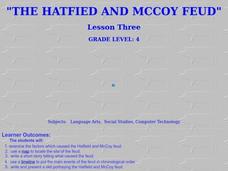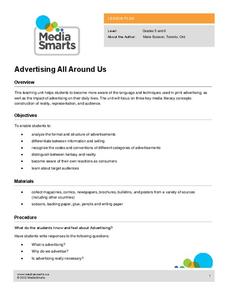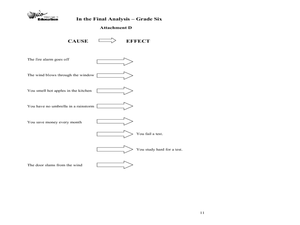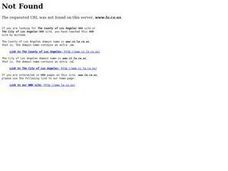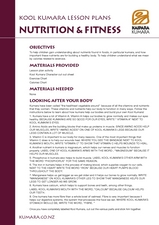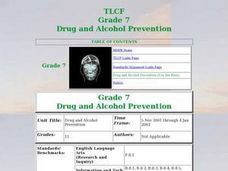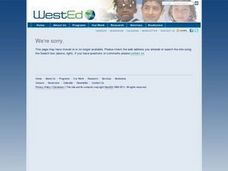Curated OER
Why We Count
Students visualize census data on a map and use a map key to read a population map. In this census lesson plan, students use a map of the Virgin Islands and corresponding worksheets to gain an understanding of population density.
Curated OER
Studying the Food Pyramid
Students explore the food pyramid and how to eat a healthy diet. In this nutrition lesson, students use pictures to make charts of food from the different food groups, record the food they eat throughout the day, investigate the...
Curated OER
Color, Play, Podcast
Learners encounter the format of a podcast and plan what content they will include. They work in small groups or with the whole class to develop an outline. Students practice reading their scripts to other learners.
Curated OER
A Picture Is Worth at Least One Word
Students explore clip art pictures to create a rebus. In this clip art lesson, students define what a rebus is and then create their original rebuses. Students use clip art from the computer to design their rebuses.
Curated OER
6-8 Interior Design: Designing My Dream Room
Students analyze interior design as a profession. For this interior design lesson, students design their own dream bedroom and explore interior design as a profession. Students draw a scaled drawing using graph paper and appropriate...
Curated OER
A Cat-and-Mouse Story
Students view an animated PowerPoint program that teaches possessive vocabulary in Spanish. They review English grammar. Students access high-frequency verbs and additional vocabulary.
Curated OER
The Hatfield and McCoy Feud
Fourth graders investigate the Hatfield and McCoy feud. In this Hatfield and McCoy feud activity, 4th graders examine factors that caused the feud. Students also locate on a map where the feud took place, make a timeline of the main...
Media Smarts
Advertising All Around Us
Here is a set of advertising lessons, explore language, techniques, representation, and target audiences. Discuss the impact ads have on our daily lives. What do we see and how do they make us feel? Observe ads from around the...
Curated OER
The Final Analysis: Cause and Effect, Fact and Opinion
Middle schoolers read and review informational texts, analyze cause and effect, and distinguish fact from opinion. They assess a "one-minute mystery" you read aloud for cause and effect relationships. Resource includes complete set of...
Curated OER
Cultural Ideas of Fashion
Students examine the role of fashion and adornment in society. They discover the factors that influence different types of clothing. They also discuss how clothing reveals cultural clues about a society.
Advocates for Human Rights
Human Rights Defined
Class members continue their investigation of the factors that influence migration with a lesson on human rights. As they examine the Universal Declaration of Human Rights and selected US Constitutional Amendments, learners compare the...
Curated OER
Topical Discussions
Engaging in topical discussions can be a great way to teach kids how to build strong arguments and support their opinions with concrete evidence. High schoolers choose a controversial topic, build an argument for or against that topic,...
ELT-Connect
Happy Valentine's Day
Shelves filled with heart-shaped boxes of chocolates. Bouquets of red roses. Racks of romantic cards. Stores are preparing for Valentine's Day. Has the holiday become too commercialized? That is the question asked by a lesson designed...
Curated OER
Listening, Pronunciation and Vocabulary Practice
Students work together in reading groups. They practice pronouncing and spelling new vocabulary words. They listen to a recording to practice their comprehension skills.
Curated OER
A Change of Climate
Pupils research various sources to learn about global warming. They then create a multimedia presentation about global warming. They take a stance on the issue and present that as well.
Curated OER
The People and Places Around Us
Students investigate the different kinds of habitats for humans, animals, and things. They illustrate the interior and exterior views of their homes. Finally they create a map key and a block map of their school neighborhood.
Curated OER
Consumerism
Seventh graders explain the concept of needs verses wants, influences on consumers, and advertising and relate those to making positive consumer choices. They break into small groups and plan a two-week day camp involving games and...
Curated OER
A Day In The Life
Students create an online newspaper documenting the politics and culture of ancient Rome. Using online tools and websites, they conduct research on ancient Roman politics and everyday culture. The informaiton gathered is used to create a...
Curated OER
Nutrition and Fitness
Sixth graders investigate the food guide pyramid. They conduct Internet research, and plan a three day nutritional menu appropriate for teenagers. Students include three meals per day and a snack for each day on their menu, and...
National First Ladies' Library
Designing the Common School: The First Educational Reform
Middle schoolers perform preliminary research to explore education before public (common) education was in place. They design a public educational system of their own. Students construct a report outlining challenges and solutions for...
Curated OER
Drug and Alcohol Prevention
Seventh graders investigate the influence of alcohol and/or drugs. They prepare a written report on the chosen topic related to drugs and/or alcohol. Students utilize technology to share the information about alcohol and/or drugs with an...
San Bernardino Co. Supt. of Schools
Was Julius Caesar a Good Leader for Rome?
Learners consider the various perspectives that different groups in Roman society may have had for Julius Caesar, such as Roman soldiers, senators, the working class, and slaves. The primary activity involves a reading of Caesar's...
Curated OER
Survival Experts
Students take on the role of survival experts as they research and produce brochures or guides to educate others about what to do in the event of a natural disaster.
Curated OER
LAND USE DEBATE / TOWN MEETING
Ninth graders research, analyze, and orally defend an issue related to the use of geologic resources. They defend their position in written form by composing a letter to an appropriate source.






